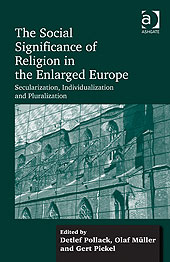Engaging with some of the central issues in the sociology of religion, this volume investigates the role and significance of churches and religion in contemporary Western and Eastern Europe. Based on an extensive international research project, it provides case studies of various countries (including Finland, Ireland, Portugal, Germany, Poland, Russia, Estonia, Hungary and Croatia), as well as cross-national comparisons. Researching more precisely the current social relevance of church and religion at different levels, The Social Significance of Religion in the Enlarged Europe raises and responds to both descriptive and explanatory questions: Can we observe tendencies of religious decline in the various Western and Eastern European countries? Are we witnessing trends of religious individualization? To what extent has there been a religious upswing in the last few years? And what are the factors causing those processes of religious change that can be observed? The book is characterised by its broad range of data and a coherent conceptual framework, whereby each chapter assesses the extent to which three important theoretical approaches in the sociology of religion - secularization theory, the market model of religion, and the individualization thesis - are applicable to the data. It will be of interest to all scholars of sociology, politics and religion who explore religious trends and attitudes in contemporary Europe.
Literature: Pollack, Detlef, Olaf Müller, and Gert Pickel (eds.), The Social Significance of Religion in the Enlarged Europe. Secularization, Individualization and Pluralization, Farnham: Ashgate 2012 (with contributions from Olaf Müller, Detlef Pollack, and Gergely Rosta).


